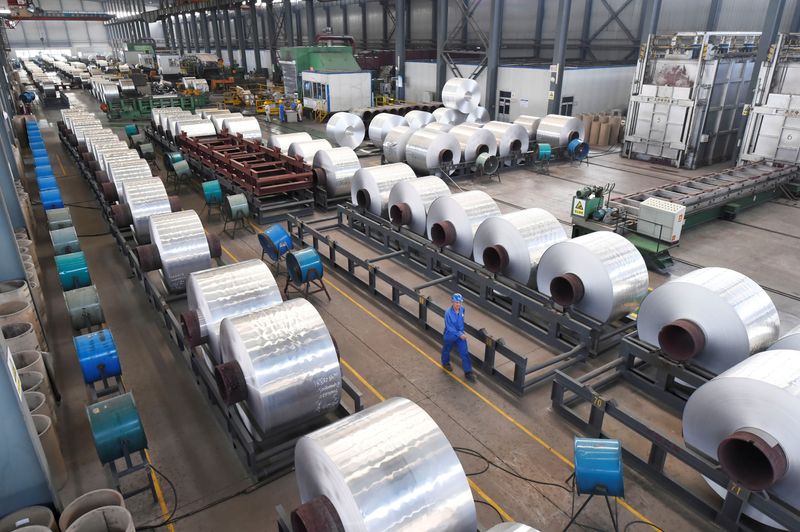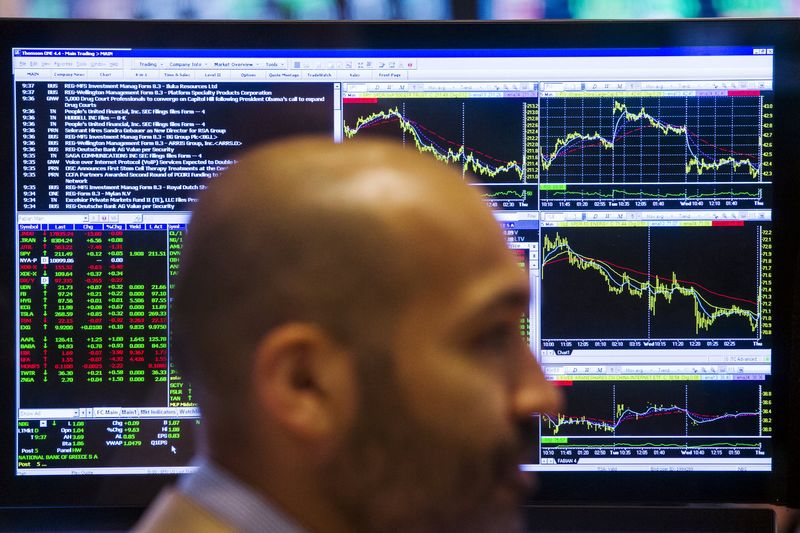By Amy Lv and Pratima Desai
BEIJING/LONDON (Reuters) – New capacity to convert bauxite into alumina, coming online next year, will ease tight supplies and potentially halt a record-breaking price rise in the material used to make aluminum.
Higher alumina prices outside China have turned the country’s largest producer and consumer from a net importer to a net exporter this year and boosted prices of aluminum used in the transportation, construction and packaging industries.
Disruptions in bauxite supplies from Guinea and Brazil and production suspensions in Australia have contributed to a 70% rise in alumina prices this year to a record 5,645 yuan ($779.77) per tonne on the Shanghai Futures Exchange. The aluminum price has risen by about 7% this year.
“There appears to be no end to this alumina crunch, not immediately,” said Eivind Kallevik, CEO of Norwegian aluminum producer Hydro.
“New alumina refineries are expected to start up in Indonesia and India, adding more tonnes to the market.”
According to the US Geological Survey, global alumina supplies totaled 140 million tonnes last year, unchanged from the previous year.
There is more supply in the pipeline.
According to information provider Shanghai Metals Market (SMM), more than 13 million tons of new capacity will come online in China next year.
In India, Vedanta (NYSE:) plans to invest in a plant with an annual capacity of 6 million tons of alumina by 2026. In Guinea, a branch of Emirates Global Aluminum plans to build an alumina refinery with a capacity of 2 million tons per year build. opened September 2026.
And in Indonesia, two state-owned companies plan to double the capacity of their refinery in West Kalimantan province to 2 million tons, but they have not specified a timeline.
Meanwhile, higher alumina prices and higher profit margins are expected to further boost the use of Chinese capacity, increasing supply. China’s alumina capacity of 102.7 million tonnes is 83.6% utilized, SMM said.
“Alumina (OTC:) producers have shown strong willingness to maintain a high business pace this year, boosted by good profit margins,” said analysts at Chinese state research firm Antaike.
“But production could be affected if heavy pollution continues for a long time this winter, causing supply to tighten.”
DOOMING EXCESS
China’s alumina exports from January to September rose 33% from the same period last year to 123.57 million tons, fetching an average price of $541 per ton, about 10% higher than the price on the Shanghai stock exchange in same period.
Some analysts see a looming oversupply and predict lower alumina prices for 2025. UBS predicts an average price of 3,600 yuan per tonne in 2025, while Antaike estimates it at 4,000 yuan per tonne.
“We expect China’s alumina market to enter a supply glut from February and prices to fall as a result,” said Sharon Ding, head of China basic materials at UBS.
In China, SMM expects the market to turn from a deficit of 235,000 tonnes this year to a surplus of 960,000 tonnes in 2025, while globally UBS expects a surplus of 890,000 tonnes in 2025 after a deficit of 920,000 tonnes in 2024.
Surpluses in 2025 are likely to be higher as demand growth slows due to a government-imposed limit of 45.5 million tonnes of aluminum production.
SET BY DISRUPTIONS
The alumina shortages this year are due to several factors.
American aluminum producer Alcoa (NYSE:) closed its Australian Kwinana refinery, with an annual capacity of 2.19 million tonnes, in the second quarter.
In May, Rio Tinto (NYSE:) declared force majeure for alumina from its refineries in Queensland, Australia. The Yarwun refinery can produce 3 million tons of alumina annually. It did not respond to a Reuters request for an update.
“A number of major sources of alumina have been lost this year, including Rio Tinto, which is not expected to return to normal production until sometime early next year,” said Liberum analyst Tom Price.
Last week, Alcoa halted bauxite shipments from the port of Juruti in Brazil due to a stranded ship, further fueling nervousness in a market already roiled by export disruptions from Guinea.

Floods in Guinea earlier this year restricted bauxite shipments, which were again disrupted when customs suspended exports from Guinea Alumina Corporation (GAC), a subsidiary of Emirates Global Aluminum (EGA).
($1 = 7.2393 renminbi)


